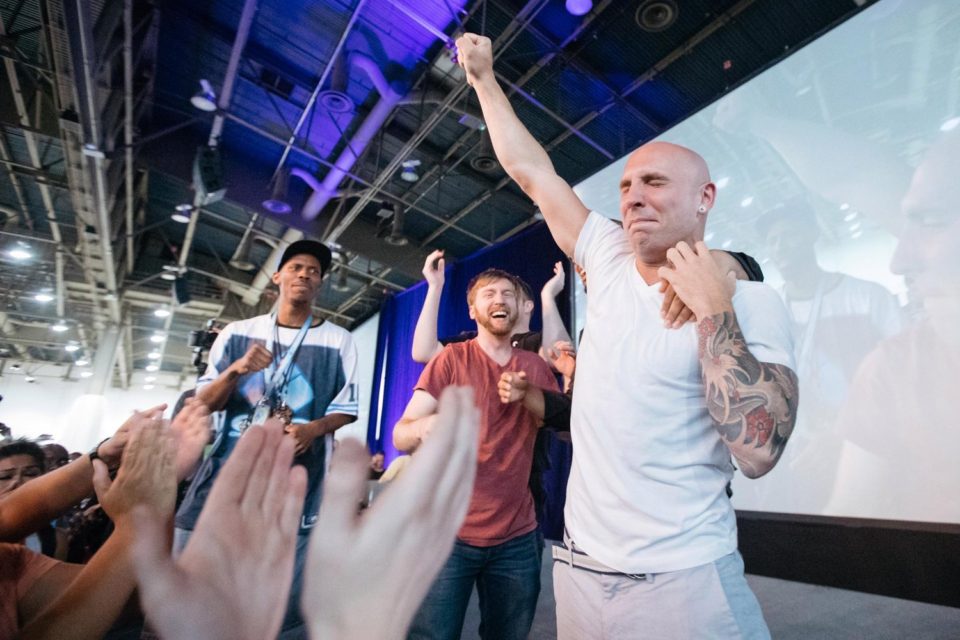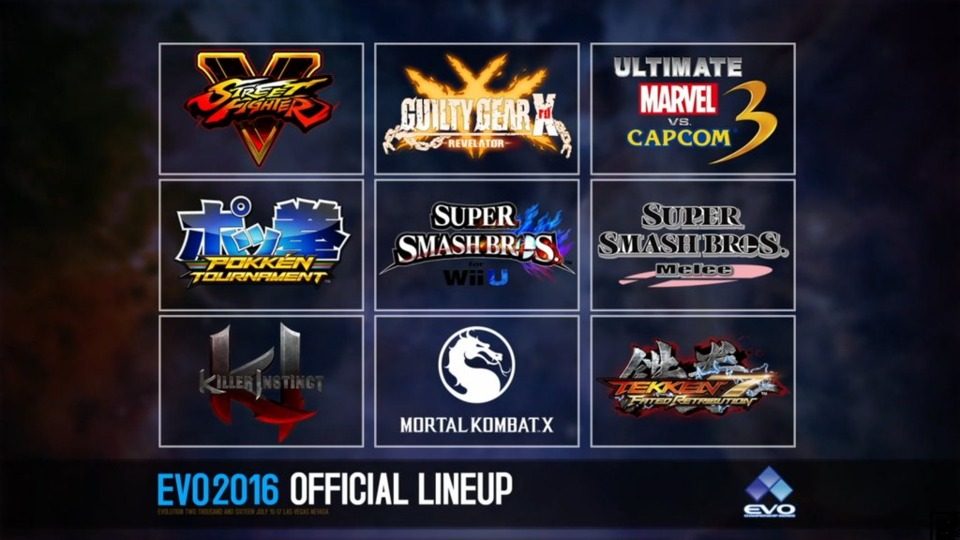EVO 2016 was a watershed moment for esports, when the world’s biggest fighting game tournament reached a larger audience then it ever had before. We examine the reluctance of the fighting game community (FGC) to embrace esports before now, how EVO and fighting games can naturally work as well as esports, and how they’re still room for improvement.
World Championship of Fighting Games
The ratings have come out for the final day of EVO 2016’s Street Fighter V tournament was televised on ESPN2. According to Nielsen, there were roughly 201,000 viewers through ESPN2, in addition to 213,927 Twitch viewers and 182,716 on the main stream. On top of the record 14,000 competitors and largest number of attendees made this the largest EVO in history. The numbers also make it one of the biggest esports events in the U.S. this year.

It’s set at a good time for television coverage too, after the NBA Finals and NHL Stanley Cup but before the MLB Playoffs and NFL regular season kick off. For non-U.S. fans, professional soccer (or football if you like) is mostly concluded by July except in the case of the World Cup, but that only happens once every four years. One might think that the FGC would have embraced this chance long ago to blow the largest fighting game tournament out to a larger audience, but that hasn’t been the case…
FGC vs. Esports
While competition in fighting games is inherent to the medium, there’s long been some resistance from the FGC from becoming esports. Part of it is a matter of behavior. The use of salty language, racial and sexual epithets and general bad attitude has been common in the FGC and in order for something to become a mainstream esport, that would definitely have to be cleaned up.
While that sort of immature behavior is something some players want to see continue, there’s also the issues with the money. Traditionally, there have been organizers which have played favorites. Players have been in on it too with collusion over pot splitting, which has been something of an open secret for years. On top of this, there are multiple “money matches” off the record, where professionals and amateurs will essentially gamble over a fight. These sorts of things would have to go away with greater oversight needed for sponsors.
Speaking of sponsors, their presence is itself a highly controversial subject. Many members of the FGC see blatant commercialism in a lot of esports events as “selling out.” Sponsorships, however, are pretty necessary to grow a prize pot for various games, and also ensure income for top level players. It’s a necessary element to take events to the next level, and there are certainly ways to present them that aren’t abhorrent to the FGC.

Putting your best foot forward
Notably, Noel Brown received suspensions from the Capcom Pro Tour for an incident where he grabbed the posterior of a female spectator. While Noel claimed there was no wrongdoing in the incident, it didn’t stop EVO and Ultra Arcade from issuing similar bans and (in the case of Ultra Arcade) terminating their sponsorships. Noel, while a talented player, has made trouble at events before by previously fighting an opponent physically in 2011 and getting into an altercation involving an ex-girlfriend in 2013. This sent a powerful message about player behavior and showed that, despite the lack of a governing body for fighting game tournaments, various circuits and events were willing to collude to make the suspension meaningful.
Capcom wants Street Fighter V to be big and they want it to have mainstream coverage as an esport. Much like how traditional sports leagues take measures to keep troublesome personalities in check, this would be a year when a lot of new people were going to check out the fighting game scene for the first time, and they wanted to have a fresh face for the industry, not one tainted by various altercations.

This year was key in establishing personalities, because Street Fighter V is so new. As a game ages, the strategies tend to codify, as do the top players. There were certainly some well known players the FGC in the tournament, but it really was a golden opportunity for a player like Joe Ciaramelli to stand out.
Joe Ciaramelli from Long Island, aka LI Joe, has been involved in the FGC, but he is what could be called a “journeyman” level talent – he would have done well at some regional tournaments, but had never made a large splash in a tournament the size of EVO 2016. To see him reach the top 8, all under the watchful eye of his proud father Bill Ciaramelli, was a storyline that wrote itself. His fun-loving personality and being the best performing U.S. citizen in the Street Fighter V tournament made him the biggest story coming out of EVO 2016.- exactly what Capcom would have wanted.
Why Fighting Games Make Great Esports
One of the advantages that fighting games have over MOBA and FPS competitive games is what you see on screen. By their very nature, MOBA and FPS games have action taking place over multiple screens. Because of this, determining what is optimal to be viewing at any one moment can be difficult to determine. Generally speaking for fighting games, all of the action is on a single screen, making the action relatively easier to follow.
Continuing the comparison with MOBAs, fighting games generally have the advantage of being simpler for their display. MOBAs will have multiple abilities going off at any one time, but unless you’re familiar with the game, it can be difficult to discern what exactly is happening. While there will often be mechanics in fighting games that most neophytes will be unfamiliar with, the fighting game basics of two fighters hitting each other until one falls down is easy to understand.
Fighting games also benefit from the quickness of the matches, allowing watchers to jump in and out of the entire tournament a bit more leisurely. With the compressed time, moment to moment matters more, and it can lead to amazing moments of clutch play. EVO Moment #37 from 2004 was one of the most famous examples, but amazing stuff like that happens every year. One great example from this year was the highly contested match up between Xian and Nemo in Street Fighter V.
Room for Improvement
There’s definitely some missing pieces when it comes to production. Announcers weren’t always aware of where players were in the bracket (sometimes, they didn’t know if they were eliminated or not). It’s not surprising this would happen with just the announcers trying to keep track of things, given the hundreds of competitors involved, but this is what a good production staff will bring, smoothing out transitions and keeping commentators up to date on the state of the overall competition.
Pokken Tournament also ran two hours over its allotted time, raising serious timing issues for that game if it should return to another EVO tournament. For that matter, the EVO organizers might want to consider extending the number of days it runs. Between the nine different games being featured, many top level players had a crowded schedule as they switched back between multiple games in a day. Many of these players commented on Twitter how difficult it was to mentally shift gears between different games. With the number of competitors now in the five digits, and likely to increase in the coming years, increasing the time where the large pool of players is aloud to whittle down might do the competitors and the competition itself a great deal of good.

One of the odder events at EVO 2016 was when a shirtless fan rushed the stage during the award ceremony for Ultimate Marvel vs. Capcom 3. While he was harmless and it’s an incident that’s easy to laugh over now, it does raise the issue of security problems. The event being broadcast live left the announcers with the awkward duty of talking around the person who was obviously someplace he wasn’t supposed to be.
Still, the tournament was overall a entertaining success, a victory for esports and the FGC. Hopefully this will mean more mainstream exposure for fighting games and additional games that can be called esports in the years ahead.

Comments










